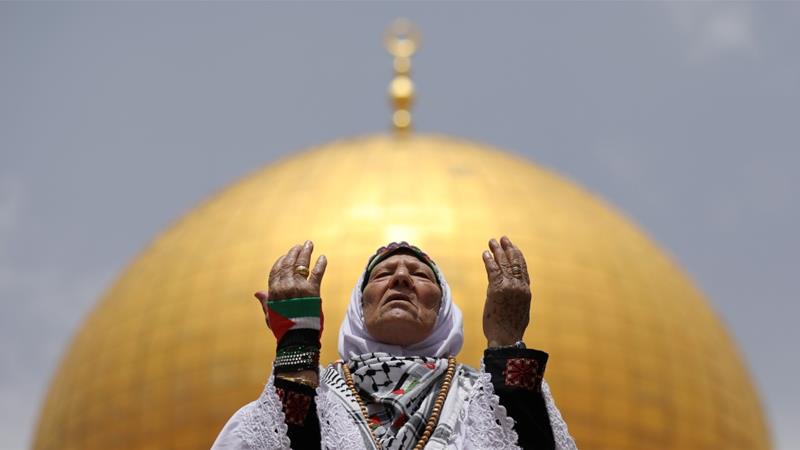What Can Palestinians Expect from the ICC?
MIDDLE EAST AND NORTH AFRICA, PALESTINE - ISRAEL, UNITED NATIONS, JUSTICE, 4 Jun 2018
The International Criminal Court has become a court of last resort for Palestinians.

The Dome of the Rock is seen in the background as a Palestinian woman prays on the second Friday of the holy fasting month of Ramadan, in Jerusalem’s Old City, May 25, 2018. [Ammar Awad/Reuters]
28 May 2018 – Seventy years have passed since the Palestinians were expelled en masse from their homes to pave the way for the creation of the state of Israel. The recent seven-week Great Return March along the Gaza fence focused the world’s attention on the still unfulfilled right of Palestinian refugees to return to their homes and the more than a decade-long Israeli blockade that has turned the Gaza Strip into an open-air prison.
It also underscored the deadly consequences of impunity – Israeli soldiers killed 111 Palestinians during the march, with most of them shot with live ammunition. As the United Nations High Commissioner for Human Rights concluded in 2017, “impunity prevails across the board for violations allegedly committed by Israeli forces, both in Gaza and the West Bank.”
It is against the backdrop of this increased violence that on May 22 the state of Palestine submitted a state referral to Prosecutor Fatou Bensouda of the International Criminal Court. In the referral, the state of Palestine “specifically requests the Prosecutor to investigate, in accordance with the temporal jurisdiction of the Court, past, ongoing and future crimes within the court’s jurisdiction, committed in all parts of the territory of the State of Palestine.”
The prosecutor has already examined the situation in Palestine within the framework of a preliminary inquiry launched in 2015, with a view to establishing whether or not there is “a reasonable basis to believe” that war crimes and crimes against humanity have been committed by Israelis and Palestinians on Palestinian territory since June 13, 2014. The state referral does not relieve the prosecutor from her duty to establish a reasonable basis to proceed.
|
The prosecutor has previously spent a decade or more reviewing situations at the preliminary examination stage from The Hague, far removed from the scenes of the crimes.
The prosecutor’s team relies on publicly available information and files submitted by civil society, such as the files my organisation, Al-Haq, together with its partners turned in regarding the 2014 offensive on the Gaza Strip that left more than 1,630 Palestinian civilians dead.
Al-Haq and its partners have also submitted a file on crimes committed in the West Bank, including Jerusalem.
These extended preliminary examinations often end up frustrating the very victims that the ICC is meant to serve. Palestine’s referral can spur the case forward, into the formal investigation stage that precedes arrest warrants and indictments – and one critical step closer to closing the impunity gap.
During the past 70 years of dispossession and 50 years of occupation, not a single Israeli high-ranking civilian or military official has been prosecuted for committing a crime against Palestinians. In the aftermath of the 2014 offensive, Al-Haq joined three other Palestinian human rights organisations in apprising the ICC prosecutor of the status of 369 criminal complaints submitted to the Office of the Israeli Military Advocate General.
The overwhelming majority of these complaints have not even been investigated – and not a single indictment has been issued. Israeli organisations have similar findings.
In the very few instances that an Israeli low-level soldier has been investigated and prosecuted, the eventual sentence handed down has not been commensurate with the severity of the criminal conduct. Most recently, in May 2018, an Israeli soldier was released after serving nine months in prison for the killing of Palestinian Abdul Fatah al-Sharif.
On camera, he shot Abdul point-blank in the head as he laid wounded and defenceless on the ground. Israeli Prime Minister Benjamin Netanyahu announced shortly following the conviction that he would support a pardon and that the soldier’s conviction marked “a painful day“.
As a representative of the Palestinian human rights organisation Al-Haq and its partners before the ICC, I have often been confronted with the proposition that past impunity may predetermine the possibility for justice in the future. What can Palestinians expect going forward?
The ICC is mired in criticism that it focuses on the African continent, that its processes are unjustifiably long, and that the scope of its investigations and prosecutions are too narrow. This criticism doesn’t negate the fact that the ICC is a court of last resort, set up to close existing impunity gaps and to function as an independent judicial institution – unhindered by politics.
As such, it can act as a counterweight to efforts by the international community to pursue endless “peace” processes at the expense of the rights of victims.
With the Trump administration’s recent recognition of Jerusalem as the capital of Israel, in violation of its own international obligations, and the lack of concrete action by the international community to hold Israel accountable, it is now more important than ever that Palestinians do not give up on their pursuit of justice.
The ICC won’t be able to ensure justice for all Palestinian victims. It can, however, see to it that Israel no longer unlawfully kills, tortures, or displaces Palestinians while stealing their land for illegal settlements, without fear of any consequences.
And while the ICC prosecutor will not be able to change the past, she may be able to positively influence the future. In opening an investigation and subsequently prosecuting senior Israelis, the ICC will be sending a powerful message that Palestinians, like all other peoples, are worthy of justice, and that redress is not a gift but a right that must be unconditionally fulfilled.
______________________________________________________
 Nada Kiswanson is a lawyer specialising in international criminal and human rights law.
Nada Kiswanson is a lawyer specialising in international criminal and human rights law.
Go to Original – aljazeera.com
Join the BDS-BOYCOTT, DIVESTMENT, SANCTIONS campaign to protest the Israeli barbaric siege of Gaza, illegal occupation of the Palestine nation’s territory, the apartheid wall, its inhuman and degrading treatment of the Palestinian people, and the more than 7,000 Palestinian men, women, elderly and children arbitrarily locked up in Israeli prisons.
DON’T BUY PRODUCTS WHOSE BARCODE STARTS WITH 729, which indicates that it is produced in Israel. DO YOUR PART! MAKE A DIFFERENCE!
7 2 9: BOYCOTT FOR JUSTICE!
DISCLAIMER: The statements, views and opinions expressed in pieces republished here are solely those of the authors and do not necessarily represent those of TMS. In accordance with title 17 U.S.C. section 107, this material is distributed without profit to those who have expressed a prior interest in receiving the included information for research and educational purposes. TMS has no affiliation whatsoever with the originator of this article nor is TMS endorsed or sponsored by the originator. “GO TO ORIGINAL” links are provided as a convenience to our readers and allow for verification of authenticity. However, as originating pages are often updated by their originating host sites, the versions posted may not match the versions our readers view when clicking the “GO TO ORIGINAL” links. This site contains copyrighted material the use of which has not always been specifically authorized by the copyright owner. We are making such material available in our efforts to advance understanding of environmental, political, human rights, economic, democracy, scientific, and social justice issues, etc. We believe this constitutes a ‘fair use’ of any such copyrighted material as provided for in section 107 of the US Copyright Law. In accordance with Title 17 U.S.C. Section 107, the material on this site is distributed without profit to those who have expressed a prior interest in receiving the included information for research and educational purposes. For more information go to: http://www.law.cornell.edu/uscode/17/107.shtml. If you wish to use copyrighted material from this site for purposes of your own that go beyond ‘fair use’, you must obtain permission from the copyright owner.
Read more
Click here to go to the current weekly digest or pick another article:
MIDDLE EAST AND NORTH AFRICA:
- How Arab-Muslim Leaders Betrayed the People
- Thirty Years of Middle East Lies just Keep Coming Back to Haunt Us
- Israeli Atrocities Continue in Lebanon
PALESTINE - ISRAEL:
- Gaza Is Our Holocaust
- Israel Kills 9 Medics and Destroys Their Ambulances in Rafah
- The Sunday Recap: Horror Stories from Gaza and the West Bank
UNITED NATIONS:
- Putin’s Proposed UN Control Over Ukraine Is Well Intentioned but Will Be Tough to Implement
- The Christian Zionist Leading the International Court of Justice
- UN Special Rapporteurs on Palestine Talk Truth to Power as Trump Takes Over the US Government
JUSTICE: